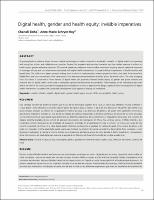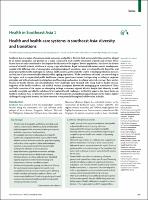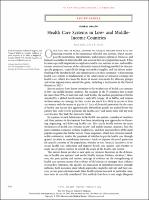Browsing by Subject "Health systems"
Now showing items 1-3 of 3
-
Digital health, gender and health equity: invisible imperatives
(Journal of Public Health, 2018-12-01)
A growing body of evidence shows the use of digital technologies in health—referred to as eHealth, mHealth or ‘digital health’—is improving and saving lives in low- and middle-income countries. Despite this prevalent and persistent narrative, very few studies examine its effects on health equity, gender and power dynamics. This journal supplement addresses these invisible imperatives by going beyond traditional measures of coverage, efficacy and cost-effectiveness associated with digital health interventions, to unpack different experiences of ... -
Health and health-care systems in southeast Asia: diversity and transitions
(The Lancet, 2011-01-25)
Southeast Asia is a region of enormous social, economic, and political diversity, both across and within countries, shaped by its history, geography, and position as a major crossroad of trade and the movement of goods and services. These factors have not only contributed to the disparate health status of the region's diverse populations, but also to the diverse nature of its health systems, which are at varying stages of evolution. Rapid but inequitable socioeconomic development, coupled with differing rates of demographic and epidemiological ... -
Health care systems in low- and middle-income countries
(Massachusetts Medical Society, 2014-02-06)
This review draws on what is now quite an extensive literature on the deficiencies of health care systems and on the Health Systems Evidence database. However, the poor quality and uneven coverage of evidence on the strengthening of health care systems means that evidence of deficiencies is stronger than evidence of remedies. Moreover, the specific circumstances of individual countries strongly influence both decisions about which approaches might be relevant and their success, so any generalizations made from health systems research in particular ...



